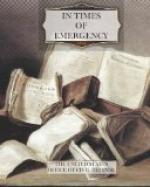* AVOID OVEREXERTION. Every winter many unnecessary deaths occur because people—especially older persons, but younger ones as well—engage in more strenuous physical activity than their bodies can stand. Cold weather itself, without any physical exertion, puts an extra strain on your heart. If you add to this physical exercise, especially exercise that you are not accustomed to—such as shovelling snow, pushing an automobile, or even walking fast or far—you are risking a heart attack, a stroke, or other damage to your body. In winter weather, and especially in winter storms, be aware of this danger, and avoid overexertion.
* * * * *
CHAPTER 5
EARTHQUAKES
If your area is one of the places in the United States where earthquakes occur, keep these points in mind:
—When an earthquake happens, keep calm. Don’t run or panic. If you take the proper precautions, the chances are you will not be hurt.
—REMAIN WHERE YOU ARE. If you are outdoors, stay outdoors; if indoors, stay indoors. In earthquakes, most injuries occur as people are entering or leaving buildings (from falling walls, electric wires, etc.).
—If you are indoors, sit or stand against an inside wall (preferably in the basement), or in an inside doorway; or else take cover under a desk, table or bench (in case the wall or ceiling should fall). Stay away from windows and outside doors.
—If you are outdoors, stay away from overhead electric wires, poles or anything else that might shake loose and fall (such as the cornices of tall buildings).
—If you are driving an automobile, pull off the road and stop (as soon as possible, and with caution). Remain in the car until the disturbance subsides. When you drive on, watch for hazards created by the earthquake, such as fallen or falling objects, downed electric wires, and broken or undermined roadways.
AFTER AN EARTHQUAKE
For your own safety and that of others, you should follow carefully the advice given in the section, “After a Natural Disaster” (page 73).
* * * * *
INDEX
Air raid see NUCLEAR ATTACK
Air raid shelters see FALLOUT SHELTERS
ARTIFICIAL RESPIRATION 58-60
Atomic bomb attack see NUCLEAR ATTACK
Attack, nuclear see NUCLEAR ATTACK
ATTACK WARNING: 17-22
Actions to take 19-20, 21-22
Attack warning signal 19
Attack warning time 18, 21
Taking cover 21-22
ATTENTION OR ALERT SIGNAL (for natural disasters) 19-20, 71-72
Basements (for use as fallout shelters) see FALLOUT SHELTERS




